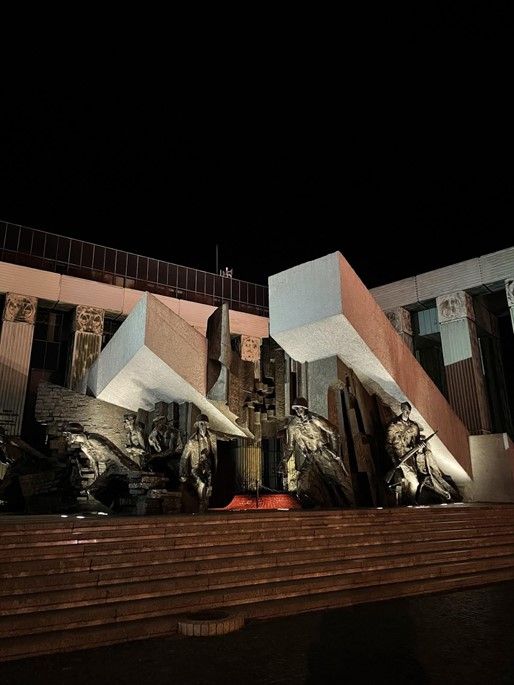Ukraine: Reshaping Europe’s Energy Future


· 6 min read
The energy shortfall brought upon by the war in Ukraine is a wake-up call for Europe to break away from hydrocarbons.

Since Russian forces launched their invasion of Ukraine in February, Europe and the United States have coalesced into a single front to counter Moscow’s unprovoked attack on a sovereign and democratic nation. As part of this joint effort, the Western alliance has coordinated sanctions striking at the core of Russia’s economy from banking to technology to even liquor and food products.
While the world can most likely survive without access to Beluga vodka and caviar, one critical area affected by sanctions destined to cause massive disruptions is undoubtedly that of energy. Just last week, the White House announced a historic ban on US imports of Russian oil. Likewise, Europe has announced plans to slash its own imports of Russian gas by as much as 66% in 2022 with further reductions planned.
Though energy sanctions will go a long way in depleting Putin’s ability to wage war, they will prove painful for much of the world’s economy, namely Europe’s. As Russia’s immediate neighbor to the west, Europe is to face an uphill battle in the coming months, as it is to bear the brunt of the energy shortfall.
Despite this, it should keep its head up high and view this crisis as an opportunity to emerge stronger by hastening its adoption of renewables and alternative sources such as nuclear energy. Europe must end its continued reliance on hydrocarbons such as gas and oil that leave it vulnerable from both an economic and security standpoint. To that end, leaders from Brussels to Berlin should rise to the occasion and act decisively to build a brighter future of energy self-sufficiency.
First of all, let us be clear on one point: an invasion of the kind seen in Ukraine is egregious and morally grotesque. But with the invasion already underway and the conflict having profound effects on the region, the crisis in Ukraine is a watershed moment that should serve as an impetus for Europe to transition faster from hydrocarbons.
If the invasion has halted any prospect of Europe further collaborating with Moscow on energy, some experts have suggested that it can look elsewhere to meet its needs in hydrocarbons. In the short term, they insist that the European Union (EU) double down on local producers by importing more liquified natural gas (LNG) from Norway. If this fails, some have even said that the US and Canada could send tanker ships filled to the brim with LNG to ports in Rotterdam and Antwerp, Berlin airlift-style.
Alternatively, Europe can rely more on its southern pipelines crossing Turkey and the Mediterranean to receive imports from places like Azerbaijan and Algeria. All these options are feasible; however, such measures should only be viewed as a temporary workaround, as such solutions still leave the continent vulnerable to geopolitical risks beyond its control and at the mercy of petro-states that may not always have the best interests in mind. Therefore, Europe needs to align its current actions with the long-term objective to break free from hydrocarbons altogether, if not for such security concerns then, for its own goals to reach net-zero emissions.
As things stand today, the EU already has a framework called the European Green Deal to slash greenhouse gas emissions by 50% by 2030 and to become fully carbon neutral by 2050. As part of this plan, the bloc has already set forth on applying the most rigorous sustainability and environmental standards on entire product categories and industries. It has also broadened the scope of research into future energy solutions that show promise, most notably nuclear fusion, and pledged to build more renewable energy infrastructure. Yet, even with all these commitments, Europe still isn’t expected to reach its targets by 2030, let alone net-zero by 2050.
Since the onset of the COVID-19 pandemic, the EU has reached some precedent-setting milestones by launching a historic recovery package, the Next Generation EU fund, as part of its seven year Multi-annual Financial Framework, a sort of provisional budget agreed upon and set by the EU Parliament. Financed by contributions from member states and common debt raised together by the bloc as a whole, over a third of the total 1.8 trillion euros in funds have been earmarked for spending on programs related to the European Green Deal.
What needs to be done now is to combine this pool of funds with additional backing from national governments to push through big and bold projects to generate, store, and distribute greater variable loads of renewable power tailored to local geographic and meteorological conditions. Finally, in order to make up for renewable’s inherent volatility, there needs to be a serious reexamination of nuclear as a medium term alternative to coal and natural gas as a base load source of energy.
Within Europe, opposition to nuclear power has grown steadily over several decades that have culminated in the anti-nuclear Green Party winning seats in government and gaining power in Germany as part of the ruling coalition. While resistance to nuclear energy is not without valid reasons, the truth is that the continent will be hard-pressed to meet any of its commitments to reduce carbon emissions on time without keeping nuclear reactors online and building additional ones based on modern technology.
Europe must therefore coalesce in the same fashion as it did in support of Ukraine’s defense to implement a plan of action to bolster its investment into new sources of energy that are both green and produced locally. Additionally, it must agree on a common framework that is pragmatic enough to include nuclear as an alternative to coal, oil, and natural gas as a source of baseline and intermediate energy demand until renewables mature enough to take over.

Since Putin launched his “special military operation” to liberate Ukraine, the world has been holding its breath in anticipation of what could be an energy crisis not seen since the 70s. If you live in Europe, you will feel the brunt of the shock, as the shortages in natural gas are bound to raise heating bills even further for households by an average of 33%.
Workaround solutions to acquire more natural gas to compensate for the shortfall to meet current demand are necessary and should be pursued. However, European leaders must realize that natural gas is but a stopgap. They must take full advantage of this moment to build the energy infrastructure of tomorrow. As the world has seen for the past three years of the pandemic, it is in times of crisis that major shifts materialize and opportunities emerge. Although Putin might have taken the adage a bit too literally, dare I say the future belongs to those who seize the opportunity today.

Future Thought Leaders is a democratic space presenting the thoughts and opinions of rising Energy & Sustainability writers, their opinions do not necessarily represent those of illuminem.
illuminem briefings

Oil & Gas · Ethical Governance
Jonathan Lishawa

AI · Energy Transition
Olaoluwa John Adeleke

Power Grid · Power & Utilities
Financial Times

Hydrogen · Energy
Vox

Energy Sources · Lithium
Al Jazeera

Oil & Gas · Energy